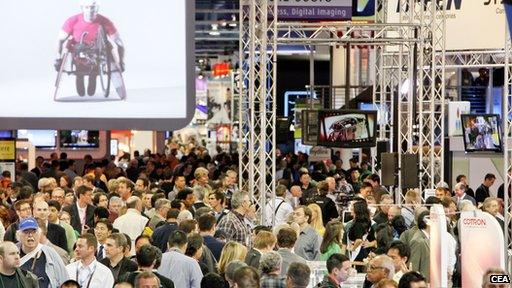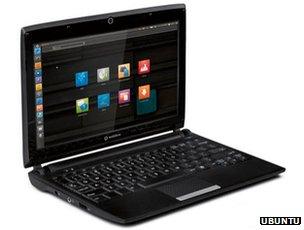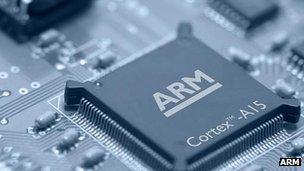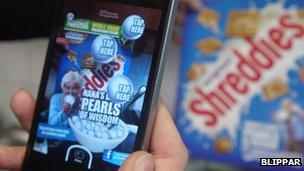Consumer Electronics Show 2012: The Brits are coming
- Published

CES has grown more than ten-fold since its first tech showcase in New York in 1967 when 250 exhibitors took part
The latest tech may be all about offering slimmer, less power-hungry devices, but the US's biggest electronics show is going the other way.
This year's International Consumer Electronics Show (CES) will sprawl across 1.8 million sq ft (167,225 sq m) - anyone planning to walk along all of its aisles faces a 15-mile (24km) trip.
About 2,700 exhibitors from 140 countries will show off their wares including approximately 20,000 new product launches.
Keynote speakers include Microsoft's Steve Ballmer, Intel's Paul Otellini and Daimler Mercedes-Benz's Dr Dieter Zetsche.
The show is not open to the public, but companies compete for the outside world's attention by trying to convince the media and other opinion formers that their kit is the most ground-breaking, thin, customisable, user-friendly, well-designed, power-efficient, high-def, fast and/or any other eye-arresting superlative.
Strong UK showing
"Smart" internet connected TVs, power-sipping ultrabook laptops and innovative interfaces are three of the big trends being tipped by the organiser - the US Consumer Electronics Association (CEA).
"We get 140,000 people from around the world who are connected to the technology industry," Gary Shapiro, the CEA's president, tells the BBC.

Canonical says Ubuntu powers millions of computers and servers, but has its eye on other markets
"People who buy it, sell it, invest in it or are touched by it - which means a lot of the business world comes to see where the trends are because increasingly their businesses are affected by technology and they have to get their messages out through technology."
There are 44 exhibitors from Britain this year, more than a 20% rise on last year's tally and more than any other European country.
Among them is Jane Silber, chief executive of Canonical, the company behind the open source Linux-based operating system Ubuntu.
Members of her firm have attended the event in the past as a networking opportunity, but this is the first time the company has its own display booth.
It has made the leap to promote an early prototype of a Ubuntu-based connected television as well as to show off the netbooks and laptops normally associated with its code.
Mrs Silber's aim is to attract manufacturers with whom she can partner to bring more devices to market.
"We are launching some new products with a greater emphasis on consumer devices and CES is frankly the place to do that," she says.
"It's a very large show and that has pros and cons. On the downside it is easy to get lost in the noise. But on the upside it's fundamentally an industry event.
"And it is a pivotal one as manufacturers use it to plan their product launches for the coming year."
Chip catch-up
Possibly the biggest British name attending the event is Arm Holdings - the Cambridge based power-efficient chip designer.
The firm does not have a public stand, but has booked its own meeting and private demonstration area.

Arm licenses its designs to more than 200 companies and receives royalties as payment
Since it licenses its architectures rather than makes its own chips, it does not have physical goods of its own to market. But that does not mean it will not make headlines.
Last year Microsoft's demonstration of Windows 8 running on an Arm-based chip was one of the show's highlights.
The system software's public beta is due for release in February and there is speculation the show could see the launch of several Arm-based laptops.
New Arm-based tablets and smartphones are also a sure bet. But the company is already looking ahead to the next generation of devices - and the chip manufacturers whose products will power them.
"I'm the kind of guy who likes to interface with our customers," says Jeff Chu, Arm's mobile computing manager.
"You're getting up at six in the morning and making sure you're ready to start having meetings at 7am and you're running all the way to midnight or beyond, whether it's catching up with old friends or a lot of business stuff that you're talking about with different people.
"It's exhausting but you get a lot of work done and a lot of business from that perspective."
CES also presents an opportunity to keep an eye on the competition. Details of Intel's imminent Medfield chips have already started to leak, suggesting the US firm may soon make headway in the tablet and smartphone market.
"I expect Intel to be making quite a bit of noise at CES," says Lance Howarth, Arm's executive vice-president of marketing.
"If Intel throws enough effort and money at it they are basically going to get to market with some devices. They have been talking about it for a number of years.
"So we fully expect Intel to be standing up there with their prototype handset and maybe alongside them someone from an industry background trying to launch a fully fledged product."
Augmented appearance
British taxpayers also have a stake in this year's event. The government agency UK Trade and Investment (UKTI) is sponsoring Blippar to attend the show.
The augmented reality start-up won a competition in November. Its prize is free accommodation and a prime-site stand in the new "Eureka Park" zone - an area designed to showcase entrepreneurs and new companies.
Four of Blippar's executives will use the opportunity to promote their smartphone app which shows information, videos and vouchers superimposed over live images of any affiliated product pictured with the device's camera.
Heinz Ketchup, Tesco and Samsung have all signed deals in the UK, and the firm recently secured a "six figure" investment from the wireless technology firm Qualcomm.
Blippar's team hopes CES will allow it to build on this momentum.

Blippar has signed up several big name brands since its summer launch, and wants to expand overseas
"CES is one of the world's biggest technology shows," says Ambarish Mitra, the firm's co-founder and chief executive.
"We feel tremendously privileged to go there. We have been working on it for the last 30 days to show what we can do.
"What we are looking to achieve is to showcase our technology.
"Our second priority is to launch Blippar with some key American partners. The technology has huge potential to grow in the US and we see CES as a critical platform to launch Blippar as a product in America."
Vegas vices
Of course, CES is not just about hard work. Some of the after-hours parties are legendary. So, it is perhaps no coincidence that the event has flourished in Sin City.
"Right away the fact that it is in Las Vegas already sprinkles a bit of worry across everything I do and everything my team does," says Mrs Silber with a chuckle.
"I have no shortage of volunteers within the company who want to go to CES!
"On the positive side I think it's intentional that they do it at the beginning of January. I think they plan it then knowing that everybody will have just come off a relaxing holiday and have enough energy to push through.
"It is gruelling but exhilarating. There is so much business opportunity and frankly there is also so much exciting technology to see that you almost don't realise how tired you are until it's over."
Blippar's team will be writing a blog of their experience of the event which will be published onBBC News's technology page.
- Published3 January 2012
- Published27 December 2011